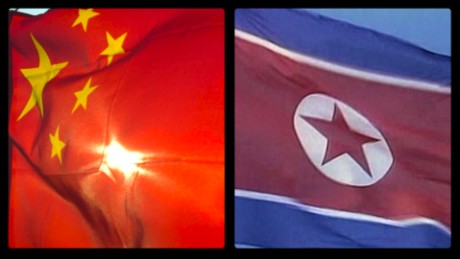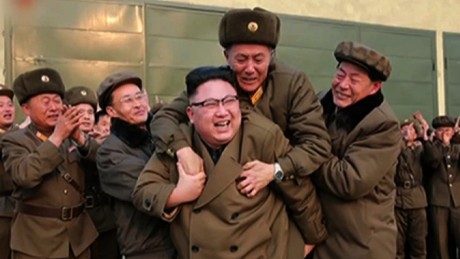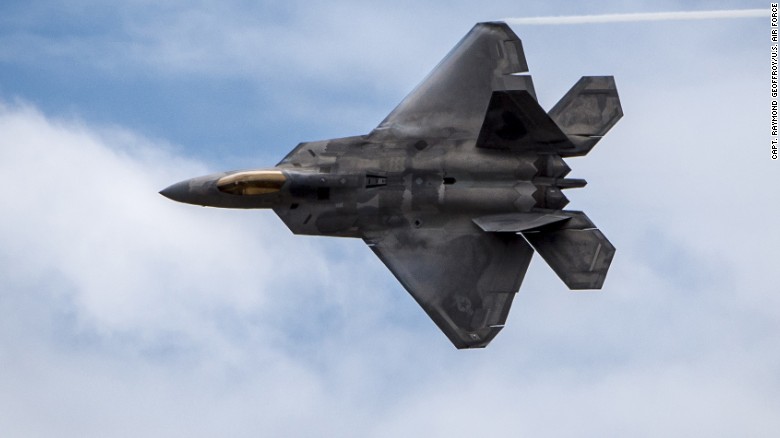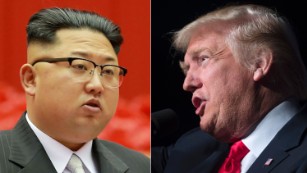How could Trump go it alone on North Korea?
US President Donald Trump says he stands ready to fix the nuclear threat posed by North Korea -- with or without China.
Trump, who will meet with China's President at his Mar-A-Lago estate this week, declared Sunday that he would be willing to go it alone to restrain the secretive country's nuclear weapons program should Beijing fail to act.
"If China is not going to solve North Korea, we will," Trump told the Financial Times in an interview.
Trump didn't elaborate on exactly how he plans to stop North Korea leader Kim Jong Un from developing his arsenal. Some analysts have suggested his cryptic comments could simply be a way to unbalance Xi Jinping ahead of the landmark summit on Thursday and Friday this week.
However, taking cooperation with China, North Korea's main ally and economic benefactor, out of the equation could lead to a much-needed change in dynamics with the provocative North Korean regime, said Anthony Ruggiero, a senior fellow at the Foundation for Defense of Democracies.
"Waiting for China to pressure North Korea didn't work for Bush, it didn't work for Obama and it won't work for Trump. We just don't have the same priorities," he said.
To date, US policy has focused on multilateral efforts -- six-country talks and United Nations sanctions -- plus waiting out the Kim regime in a policy known as strategic patience. But all these have had little effect, with North Korea ramping up its missile and nuclear programs since 2016.
So what might unilateral US action on North Korea look like?

China & North Korea: A complicated relationship
Option 1: Engagement
On at least three occasions on the campaign trail, Trump floated the radical approach of talking with Kim, potentially over a hamburger.
"I don't think a burger and fries is going to solve this one," said Lanhee Chan, a research fellow at the Hoover Institution.
Why Trump should strike a deal with North Korea
"I don't think this is one of those things that can be solved overnight, and if there is to be diplomacy it's going to have to be take place over an extended period of time and is going to have to resolve some very, very tricky issues."
Pyongyang has indicated it is open to negotiation butwon't commit to complete denuclearization as a pre-condition for talks.
It may be willing to suspend its nuclear and missile programs if Washington addresses its security concerns in return, said Leon Sigal, director of the Northeast Asia Cooperative Security Project at the Social Science Research Council in New York.
"The only way out of Trump's predicament is acceptance -- resume talks with North Korea, the sooner the better, to probe whether it is willing to suspend arming," Sigal wrote in an op-ed for CNN before Trump's latest pronouncements.
Of course, this kind of strategy would be hugely risky, and the country's most recent provocations make any kind of US outreach difficult.
After a lull in activity that coincided with Trump's election, North Korea launched a new type of missile as Trump met with Japan's leader Shinzo Abe on February 12. Since then, it has tested six missiles and conducted two rocket engine tests.

North Korea celebrates rocket engine test
The country's international standing has deteriorated further after the assassination of Kim's estranged half brother, Kim Jong Nam, with VX nerve agent at Kuala Lumpur International Airport. North Korea has denied any involvement.
Option 2: Tighten the screws
Ruggiero says the US needs to go after big Chinese banks and companies suspected of aiding North Korea more aggressively, citing the precedent of the financial penalties paid by European banks for dealing with Iran while US sanctions were in place.
"Trump needs to unleash the Treasury Department to investigate Chinese companies and banks, tell them it's not going to be allowed and fine them," said Ruggiero, who helped draft Iran legislation while working for Sen. Marco Rubio.
On Friday, the Treasury sanctioned 11 North Koreans and one North Korean company for their links to the country's weapons program and violating UN sanctions -- but Ruggiero said US authorities needed to focus their attention on China.
Other analysts say sanctions, no matter how sophisticated, aren't going to bring the North Korean regime to its knees.
"The bottom line is that the last thing they're going to cut is the military," said John Delury, an associate professor of Chinese studies at Yonsei University in South Korea.
Peter Layton, a visiting fellow at the Griffith Asia Institute in Australia, says the US needs to convince China that it's actively keeping an unwanted regime alive by using forums like the G20 and UN to press this message.
"Convince the Chinese leadership that it is hurting itself by helping the DPRK. Keep publicly linking Kim Jong Un to Xi Jinping, try to associate them in the global public mind as much as possible," he said.
Tillerson to warn China of sanctions over North Korea
Option 3: Military action
On his inaugural trip to Asia last month, Secretary of State Rex Tillerson said the US would consider military action against North Korea if provoked.
"Certainly, we do not want things to get to a military conflict ... but obviously, if North Korea takes actions that threaten the South Korean forces or our own forces, then that would be met with an appropriate response," he said.
While the US possesses overwhelming firepower compared to North Korea, any American strike on North Korea could expose South Korea to devastating casualties, analysts say.
"Everything is doable, but it all boils down to what risks you are willing to take versus the outcome you hope to achieve," said Carl Schuster, a professor at Hawaii Pacific University and former director of operations at the US Pacific Command's Joint Intelligence Center.
In a series of reports prepared in May 2016, the Texas-based geopolitical analysis group Stratfor said the US could assemble a force that could rain down more than 600 cruise missiles and smart bombs on North Korean targets in a pulverizing first strike.
The weapons could be deployed with stealth B-2 bombers and F-22 Raptors, massive Ohio-class guided-missile submarines and a selection of cruisers and destroyers, it said.
The problem, as Stratfor points out, is that Pyongyang has mobile launch vehicles that could then plausibly send a nuclear weapon toward South Korea or Japan -- with unimaginable consequences.
Trump does have some non-lethal military options that might not result in a North Korean counterstrike, according to Layton, who is also a former Royal Australian Air Force officer.
He suggests a simple blockade of any ships leaving and entering North Korean waters.
Another more risky option is to use US warships equipped with the Aegis anti-missile system to shoot down any future North Korean missile tests, Layton said.
Covert raids by special forces in North Korea would be too risky and expose US troops to capture, experts said. Plus there are few signs of an elite or popular resistance ready to challenge the regime even if the US were able to decapitate it.
"Regime change is spy novel stuff," said Delury.
News Courtesy: www.cnn.com












